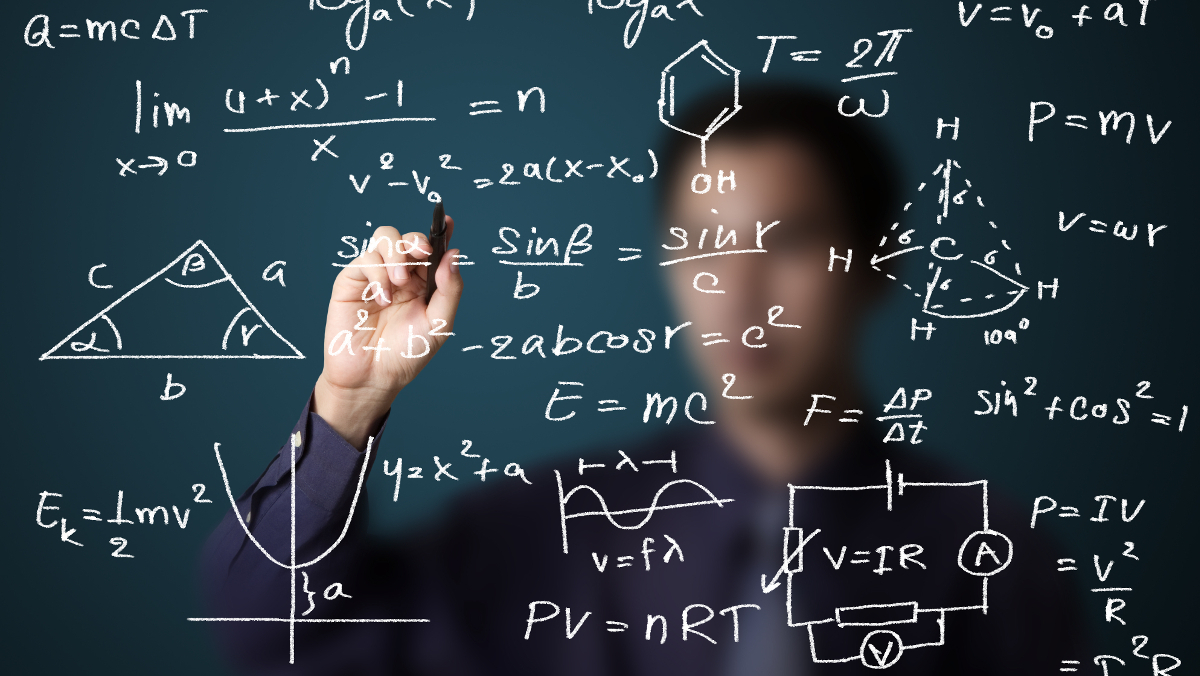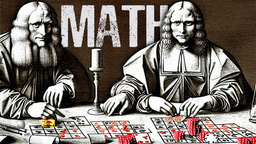Arguing for the potential of philosophy of mathematics and of science to enhance mathematics education
Published in Education and Philosophy & Religion

‘Mathematical anxiety’ and understanding of mathematics
A kind of ‘mathematics anxiety’ has always been detected and reported in the empirical realm of mathematics education by all participants in the phenomenon – students, parents, teachers, policy makers, and researchers. Studies within mathematics education have confirmed the existence of this so-called “mathematics anxiety” among secondary and high school students as a global phenomenon and have related it to various social and psychological aspects of the processes of teaching and learning mathematics. The concept of understanding of mathematics has been employed in the analysis of both the causes and the effects of this anxiety: a poor or improper understanding of the taught mathematics leads to anxiety and conversely, anxiety affects understanding. [Stodolsky (1985), Passolunghi et al. (2016), Foley et al. (2017), Núñez-Peña & Bono (2019), Holmes & Hwang (2016), Guita & Tan (2018), and Choi-Koh & Ryoo (2019)].
In general, past research on the relationship between understanding of mathematics and ‘mathematics anxiety’ has been conducted with the concepts and methods of educational sciences and psychology; the causes, the effects, and the proposed methodologies for the enhancement of mathematics teaching with respect to this relationship have been analyzed relative to various social and psychological aspects of the processes of teaching and learning mathematics, that is, in a theoretical framework specific to social sciences.
Conceptual and procedural mathematical knowledge
There is a consensus that mathematical knowledge is of two distinct kinds: conceptual and procedural knowledge and the relations between conceptual and procedural knowledge are often bi-directional and iterative (Rittle-Johnson & Schneider, 2015). Accordingly, we have conceptual and procedural understanding of mathematics and conceptual and procedural approaches toward teaching mathematics. This distinction maintains a tension between the two teaching approaches, not that they cannot collaborate or be unified, but rather, relative to the practical circumstances of the teaching practice, which actually impose instructors to teach in one way or another.
In practice, the inclination toward the procedural approach is largely the result of policy making, which imposes a “socially useful” mathematics to be taught in schools. This approach is somehow justified by the constraints of the school setup: the limited time frame of a class, the pragmatic goal of passing tests and exams (which are based on problem solving), and the applicative nature of mathematics itself.
Intensional and extensional conceptual mathematical knowledge
There is general consensus that conceptual knowledge in mathematics should be defined as knowledge of mathematical concepts, the ways they can be known through their relationships (Hiebert, 1986, pp. 3-4; Star, 2005), knowledge about facts, generalizations and principles (Baroody, Feil, & Johnson, 2007, p.107). However, this view does not extend knowledge much beyond the mere content of mathematics as a discipline, its formalism, principles, and methods. In this intensional view, conceptual knowledge is just a mathematical perquisite of procedural knowledge. Knowledge about mathematics as a whole, its nature and specificity among other disciplines, and methods of acquiring knowledge do not fall within this view: further, the complex epistemology of mathematics does include this kind of knowledge, both intensional and extensional (we are talking here about language, semantics, symbolism, structure, epistemic virtues, truths, motivations and goals, empirical influence, applicability, and cognitive and anthropocentric aspects, among others).
Philosophical disciplines and mathematics education
Given the special place mathematics and its nature hold as an object of study in an intersecting zone of epistemology, philosophy of mathematics, and philosophy of science as theoretical-philosophy disciplines, and adjacently, fundamentals of mathematics and history of mathematics, theoretical contributions for an epistemological framework of enhancing mathematics education through a holistic approach are expected to come from these domains. Their potential in this respect has already been established in the works of Ernest (1989, 1991, 1994), Ernest et al. (2016, pp. 3-17), (Godino & Batanero, 1998), Skovsmose (2013/1994), Kitcher (1983), and others, but it was not explored from a practical-applicative perspective in mathematics education, nor applied in the policies of education.
It is not surprising that we place philosophy of science in the list of the potential contributors, since applicability of mathematics and its constitutive role in sciences is a field investigated within this discipline and accounts for the nature of mathematics. Besides, both philosophy of mathematics and philosophy of science have an inner educational dimension that potentially can be exploited in mathematics and science education.
It should be noted that fundamentals and history of mathematics, although having tight connections with philosophy of mathematics and of science, cannot alone provide the extensional knowledge that the philosophical disciplines can provide in order to enrich traditional conceptual knowledge. From a historical perspective, fundamentals of mathematics provide the formalisms of the various theories as attempts to overcome contradictions, paradoxes, or inadequacies, as a foundation of mathematics. But the content of this sub-discipline can be assimilated with the traditional mathematical content taught in schools, since it reflects how mathematics is constructed and has the same formal nature; however, it does not provide the whole picture of the nature and features of mathematics in relation to general and scientific knowledge. Insights from fundamentals and history of mathematics are present to some extent in the curriculum of several systems of high school education worldwide, mostly as notes or optional content; they are taught as disciplines in many mathematics departments of colleges or universities instead.
Unexpectedly, the line of argument of the classical works in 1980s ands 1990s, showing the potential of the mentioned philosophical disciplines to enhance mathematics education, has been ignored at large in further research in mathematics education, practice, and policies.
None focused on arguing for and making applicable the general principle that teaching about mathematics along with traditionally teaching formal mathematics and ‘doing’ mathematics does not render the process more difficult; rather, it enhances mathematics education, with effects on decreasing mathematics anxiety and stimulating performance. We can fairly hypothesize that a philosophically enhanced conceptual understanding of mathematics makes one a better problem solver eventually. This hypothesis is already supported by past research on the relations between the conceptual and procedural learning of mathematics (see for instance Baroody, 2003; Rittle-Johnson & Siegler, 1998; Rittle-Johnson et al., 2001).
Two additional arguments for employing philosophy
The necessity of turning to philosophy for mathematics-education needs was motivated in the works of Ernest, Godino & Batanero, Skovsmose, Kitcher (cited in the previous section) and others, who provided arguments based on conceptual clarification, and the cultural and social dimension of mathematics. A similar though differently motivated necessity was advanced for the case of science education (Hills, 1992; Matthews, 1994; Mellado et al., 2006; Höttecke and Silva, 2011; and others), which can stand as an adjacent argument for the mathematical case. Call this as a whole the disciplinary argument.
I will also propose two new arguments, related this time to mathematics itself as an epistemic construct: First, the ‘foundational-dependence’ argument, based on the premise that philosophy has influenced dramatically the foundations and development of mathematics through its critical questions, conceptual debates, analysis of paradoxes, consistency, and adequacy. Further, contribution to the foundation of mathematics will be shown to imply the potential for contribution in understanding of mathematics. Second, the ‘nature-of-mathematics’ argument, based on philosophical investigations into the nature of mathematics (including open questions), which runs on the line of thought that philosophical inquiry on the mathematical concepts, and the concept of mathematics as a whole, adds knowledge on the subject even through its open questions, while stimulating critical thinking, which goes hand in hand with both conceptual understanding and the analytical skills required in mathematical learning and practice (Barboianu, 2021).
Mathematical understanding
In the research of mathematical education, the problem of defining a concept of mathematical understanding has been given a central role. Skemp (1976) distinguished between relational and instrumental understanding in mathematics; Nickerson (1985, pp. 229 - 236) identified understanding through its results and the relationships of these results to established knowledge. Hiebert & Carpenter (1992, p. 67) advanced a similar definition for understanding as involving the building of a conceptual structure based on mental representations. Sierpinska (1994, Ch. 2 - 3) distinguished between the ‘act of understanding’, ‘understanding’ as the result of that act, and ‘processes’ of understanding as further cognitive activity. More recent views (such as Dreyfus & Eisenberg, 2012; Pino-Fan et al., 2015; Greeno, 2017; Newton & Sword, 2018) either offer refined versions of these definitions or advance other relationships between the same basic constituent concepts. Let us note that all of these views are more intensional than extensional and draw on the idea that mathematical understanding should be defined structurally.
In theoretical philosophy, understanding is tightly related to the epistemic concepts of meaning and context, not only in what concerns language, but as a general epistemological concept that involves valuable and distinguishable knowledge (see Kvanvig, 2003, 2009; De Regt & Dieks, 2005; Grimm, 2014). But the meaning of mathematical concepts, statements and theories, and context of the creation, development and application of mathematics – all these are investigated within epistemology, fundamentals of mathematics, philosophy of mathematics and of science, and even of language. Importance of meaning has already been established in research as concerns prospecting a theory of mathematical education, still in relation to the philosophical aspects of mathematics (see Godino, 1996; Godino & Batanero, 1998); context, on the other hand, has not been sufficiently researched and one task would be to identify exhaustively the contexts of mathematical understanding (among which are the logical, theoretical, applicative, epistemic, historical, and perhaps the anthropocentric) and incorporate them into the new notion of holistic mathematical understanding that we propose, which is intended to be both intensional and extensional, and to reflect the entire specificity of mathematics. It is the context component of understanding that can reflect this specificity more than the meaning can reflect: Mathematics is by its nature both abstract and concrete, theoretical and applicative, discipline and language, discipline and method, mental activity and propositional construct; mathematics is self-generative and self-applicative, and includes second- and higher-order predications.
Foreseen outcomes of the epistemic holistic approach
In such an epistemological framework, we can investigate the hypothesis that many teaching methods and strategies used for and assumed to enhance explanation of mathematical concepts are not enough in ensuring a full understanding (in particular, example-based and metaphorical explanation – that is, making mathematics look “friendlier” or “fun”, including through new video and web technologies, is hypothesized to provide only mental-cognitive comfort for the student and not to add new active knowledge on the topic).
The classical definitions of mathematical understanding put forward a plurality of “understandings”, suggesting that we cannot talk about understanding per se. But such separations make difficult any attempt to unify the conceptual and procedural approaches of teaching, and maintain a tension between them. A holistic concept of understanding defined on epistemological grounds complies with the aim of unifying the conceptual and procedural approaches of teaching and would also accommodate with the alleged psychological nature of understanding as a ‘mental state’ (which is meant as singular).
References
Baroody, A. J. (2003). The development of adaptive expertise and flexibility: the integration of conceptual and procedural knowledge. Mahwah, NJ: Erlbaum.
Baroody, A. J., Feil, Y., & Johnson, A. R. (2007). Research commentary: An alternative reconceptualization of procedural and conceptual knowledge. Journal for research in mathematics education, 38(2), 115-131.
Barboianu, C. (2021). What is Mathematics: School Guide to Conceptual Understanding of Mathematics. PhilScience Press. Synopsis
Choi-Koh, S. S., Ryoo, B. G. (2019). Differences of math anxiety groups based on two measurements, MASS and EEG. Educational Psychology, 39(5), 659–677. doi: 10.1080/01443410.2018.1543857
De Regt, H., Dieks D. (2005). A Contextual Approach to Scientific Understanding. Synthese, Vol. 144, 137-170.
Dreyfus, T., Eisenberg, T. (2012). On different facets of mathematical thinking. In The nature of mathematical thinking. Routledge: 269-300.
Ernest, P. (1989). The knowledge, beliefs and attitudes of the mathematics teacher: A model. Journal of education for teaching, 15(1), 13-33.
Ernest, P. (1991). The Philosophy of Mathematics Education. London: Farmer Press.
Ernest, P. (1994). Social constructivism and the psychology of mathematics education. In P. Ernest (Ed.), Constructing mathematical knowledge: Epistemology and mathematical education. Washington: The Falmer Press, 62-72.
Ernest, P., Skovsmose, O., Van Bendegem, J. P., Bicudo, M., Miarka, R., Kvasz, L., Moeller, R. (2016). The philosophy of mathematics education. New York: Springer International Publishing.
Foley, A. E., Herts, J. B., Borgonovi, F., Guerriero, S., Levine, S. C., & Beilock, S. L. (2017). The math anxiety-performance link: A global phenomenon. Current Directions in Psychological Science, 26(1), 52–58.
Godino, J. D. (1996). Mathematical concepts, their meanings and understanding. In PME conference (Vol. 2, pp. 2-417). The program committee of the 18th PME conference.
Godino, J. D., Batanero, C. (1998). Clarifying the meaning of mathematical objects as a priority area for research in mathematics education. In A. Sierpinska (Ed.), Mathematics education as a research domain: A search for identity. Dordrecht: Springer, 177-195.
Greeno, J. G. (2019/1983). Forms of understanding in mathematical problem solving. In S.G. Paris, G.M. Olson, H.W. Stevenson (Eds.), Learning and motivation in the classroom. Routledge, 83-112.
Grimm, S. (2014). Understanding as Knowledge of Causes. In A. Fairweather (Ed.), Virtue Epistemology Naturalized: Bridges Between Virtue Epistemology and Philosophy of Science. Dordrecht: Springer, 329-346.
Guita, G. B., Tan, D. A. (2018). Mathematics anxiety and students’ academic achievement in a reciprocal learning environment. International Journal of English and Education. 7(3), 112–124.
Hiebert, J., Carpenter, T. P. (1992). Learning and Teaching with Understanding. In D. A. Gruows, (Ed.), Handbook of Research on Mathematics Teaching and Learning: A project of the National Council of Teachers of Mathematics. New York: Macmillan, 65-97.
Hiebert, J. (1986). Conceptual and Procedural Knowledge: The Case of Mathematics. Hillsdale, NJ: Erlbaum.
Hills, S. (Ed.). (1992). The history and philosophy of science in science education. Proceedings of the Second International Conference on the History and Philosophy of Science and Science Teaching. IHPST Group.
Holmes, V. L., Hwang, Y. (2016). Exploring the effects of project-based learning in secondary mathematics education. The Journal of Educational Research, 109(5), 449–463.
Höttecke, D., Silva, C. C. (2011). Why implementing history and philosophy in school science education is a challenge: An analysis of obstacles. Science & Education, 20(3-4), 293-316.
Kitcher, P. (1983). The nature of mathematical knowledge. New York: Oxford University Press.
Kvanvig, J. L. (2003). The Value of Knowledge and the Pursuit of Understanding, Cambridge: Cambridge University Press.
Kvanvig, J. L. (2009). The Value of Understanding. In A. Haddock, A. Millar, & D. Pritchard (Eds.), Epistemic value. Oxford: Oxford University Press, 95–111.
Matthews, R. (1994). Science teaching: the role of history and philosophy of science. New York: Routledge, Psychology Press.
Mellado, V., Ruiz, C., Bermejo, M. L., Jiménez, R. (2006). Contributions from the philosophy of science to the education of science teachers. Science & Education, 15(5), 419-445.
Newton, K., Sword, S. (2018). Mathematical learning and understanding in education. Routledge.
Nickerson, R. S. (1985). Understanding ‘Understanding’. American Journal of Education, 93(2), 201-239.
Núñez-Peña, M. I., Bono, R. (2019). Academic anxieties: Which type contributes the most to low achievement in methodological courses? Educational Psychology, 39(6), 797–814.
Passolunghi, M. C., Caviola, S., De Agostini, R., Perin, C., & Mammarella, I. C. (2016). Mathematics anxiety, working memory, and mathematics performance in secondary-school children. Frontiers in psychology, 7(42).
Pino-Fan, L., Guzmán, I., Duval, R., Font, V. (2015). The theory of registers of semiotic representation and the onto-semiotic approach to mathematical cognition and instruction: Linking looks for the study of mathematical understanding. In Proceedings of the 39th Conference of the International Group for the Psychology of Mathematics Education (Vol. 4, pp. 33-40). IGPME.
Rittle-Johnson, B., Siegler, R. S. (1998). The relation between conceptual and procedural knowledge in learning mathematics: A review. In C. Donlan (Ed.), The Development of Mathematical Skills. London: Psychology Press, 75-110.
Rittle-Johnson, B., Siegler, R. S., & Alibali, M. W. (2001). Developing conceptual understanding and procedural skill in mathematics: An iterative process. Journal of Educational Psychology, 93(2), 346–362.
Rittle-Johnson, B., Schneider, M. (2015). Developing conceptual and procedural knowledge of mathematics. In R. Cohen Cadosh & A. Dowker (Eds.), Oxford handbook of numerical cognition, Oxford: Oxford University Press, 1118-1134.
Sierpinska, A. (1994). Understanding in Mathematics. London: The Falmer Press.
Skemp, R. R. (1976). Relational understanding and instrumental understanding. Mathematics teaching, 77(1), 20-26.
Skovsmose, O. (2013). Towards a philosophy of critical mathematics education (Vol. 15), originally published in 1994. Dordrecht: Springer Science & Business Media.
Stodolsky, S. S. (1985). Telling math: Origins of math aversion and anxiety. Educational psychologist, 20(3), 125–133.
Star, J. R. (2005). Reconceptualizing procedural knowledge. Journal for Research in Mathematics Education, 36(5), 404–411.
Image credit: iapsc.org





Please sign in or register for FREE
If you are a registered user on Research Communities by Springer Nature, please sign in